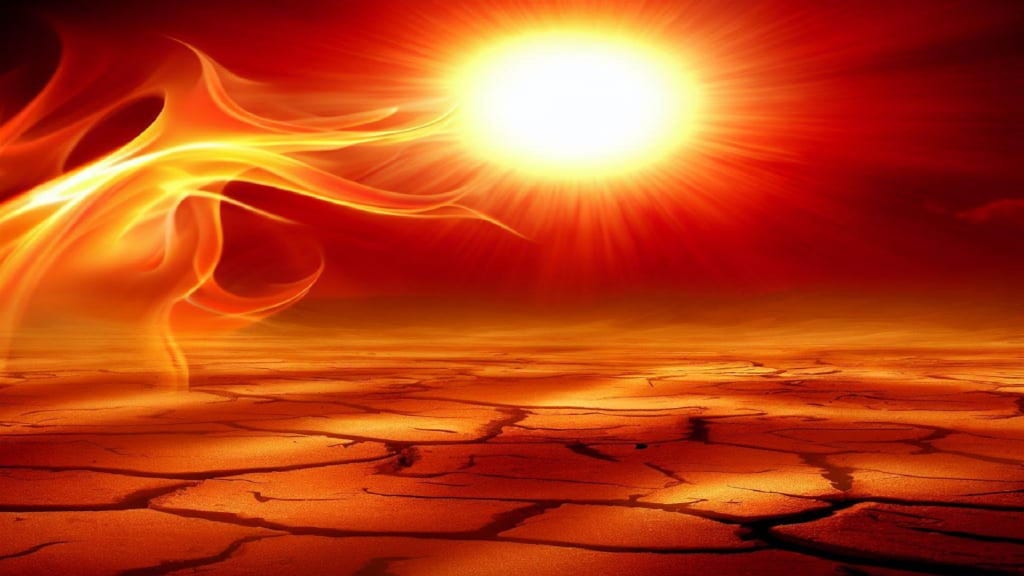Greece Faces Hottest July Weekend in 50 Years, Forecaster Says, as Scores of Wildfires Rage
Greece is grappling with an unprecedented heatwave, with meteorologists predicting that the upcoming weekend will be the hottest July weekend the country has experienced in half a century.

Greece is grappling with an unprecedented heatwave, with meteorologists predicting that the upcoming weekend will be the hottest July weekend the country has experienced in half a century. As the temperatures soar to record-breaking levels, the nation is facing multiple challenges, including widespread wildfires that are causing devastation to its landscapes and communities. In this article, we will delve into the causes and consequences of this scorching heatwave and explore how Greece is coping with the natural disaster.
The Heatwave in Greece
1. Record-breaking Temperatures
Over the past few weeks, Greece has been experiencing an extreme heatwave that has shattered previous temperature records. The mercury has been relentlessly rising, and experts attribute this phenomenon to the intensification of global warming and climate change. The combination of high temperatures and prolonged heatwaves poses severe threats to human health, particularly to vulnerable populations, including the elderly and young children.
2. Impact on Health and Environment
The soaring temperatures have led to a surge in heat-related illnesses across the country. Hospitals and medical facilities are grappling with an influx of patients suffering from heat strokes and dehydration. Additionally, the excessive heat is putting immense pressure on Greece's energy infrastructure, leading to electricity shortages and a surge in demand for cooling systems.
The environment is also bearing the brunt of this extreme heat. Wildfires have become rampant, and scores of them are blazing through various regions of the country, consuming vast areas of forests and destroying habitats for wildlife.
3. Challenges in Wildfire Suppression
Greece is facing an uphill battle in suppressing the raging wildfires. The combination of dry vegetation, strong winds, and high temperatures has created the perfect conditions for these fires to spread rapidly. Firefighters, along with volunteers, are working tirelessly to contain the flames, but the sheer scale and intensity of the wildfires make it a daunting task.

The Causes of the Heatwave
1. Climate Change and Global Warming
One of the primary drivers of this heatwave is the ongoing global climate crisis. The increase in greenhouse gas emissions has led to a rise in the Earth's average temperature, contributing to extreme weather events such as heatwaves, droughts, and wildfires. Greece's current situation is a stark reminder of the urgent need for global climate change mitigation measures.
2. Local Weather Patterns
The geographical location of Greece plays a role in the intensity of its heatwaves. The country's proximity to large bodies of water, such as the Mediterranean Sea, can influence local weather patterns. When air masses from the sea collide with hot air from the land, it can result in temperature spikes, exacerbating the heatwave.
3. Human Activities and Urban Heat Island Effect
Urbanization and human activities, such as deforestation and construction, have contributed to the "urban heat island" effect. Cities tend to be hotter than rural areas due to the abundance of heat-absorbing materials like concrete and asphalt. This localised heating amplifies the overall heatwave conditions.
The Devastating Wildfires
1. Regions Affected
The wildfires have spread across several regions of Greece, including popular tourist destinations. Coastal areas and picturesque islands have been engulfed in flames, posing threats to both residents and vacationers.
2. Efforts of Firefighters and Volunteers
The firefighting teams, along with volunteers, have been at the forefront of battling the wildfires. These brave individuals are risking their lives to protect communities, homes, and wildlife. Their dedication and bravery deserve commendation.
3. Damage to Flora, Fauna, and Property
The wildfires have left a trail of destruction in their wake. Vast stretches of forests have been reduced to ashes, affecting diverse ecosystems and endangering numerous plant and animal species. Additionally, homes, businesses, and infrastructure have been lost, causing immeasurable economic and emotional distress to the affected communities.
Coping with the Heatwave
1. Safety Measures for Individuals
In the face of such extreme heat, individuals must take precautions to protect themselves. Staying indoors during peak temperatures, staying hydrated, and avoiding strenuous outdoor activities are essential safety measures.
2. Government Initiatives
The Greek government is actively involved in managing the crisis. Emergency response teams are working tirelessly to coordinate relief efforts and provide aid to affected regions. Authorities are also issuing warnings and advisories to the public, emphasising the importance of staying safe during the heatwave.
3. Community Support and Solidarity
Communities are coming together to support one another during these challenging times. Local organisations and individuals are offering assistance to those in need, reflecting the spirit of solidarity that defines Greece's resilience.
Environmental Concerns
1. Impact on Biodiversity
The wildfires have triggered concerns about the impact on Greece's rich biodiversity. Many species of plants and animals face habitat loss, and some may be pushed to the brink of extinction. The long-term ecological consequences are likely to be significant.
2. Air Quality and Pollution
The smoke and pollutants released by the wildfires pose serious health risks to residents, particularly those with respiratory conditions. The poor air quality can exacerbate existing health issues and have long-term implications for public health.
3. Long-term Consequences
Even after the fires are extinguished, the aftermath will continue to pose challenges. Rehabilitation efforts will need to focus on reforestation, rebuilding communities, and supporting affected individuals to restore normalcy in their lives.
Raising Awareness and Taking Action
1. Climate Change Mitigation
The Greek heatwave is a stark reminder of the urgency to address climate change. It is essential for individuals, communities, and nations to take collective action to reduce greenhouse gas emissions and promote sustainable practices.
2. Disaster Preparedness
Investing in disaster preparedness and response mechanisms is crucial to better cope with extreme weather events. Equipping communities with the knowledge and tools to face such challenges can save lives and minimize damage.
3. Sustainable Practices
Promoting sustainable practices, such as renewable energy adoption and responsible land use, can help mitigate the effects of climate change and reduce the risk of future heatwaves and wildfires.
Conclusion
Greece is facing an unprecedented heatwave and wildfire crisis, highlighting the urgent need for global climate change mitigation and disaster preparedness. As temperatures soar to record-breaking levels, communities and authorities are working tirelessly to protect lives, property, and the environment. It is crucial for individuals, governments, and the international community to come together, raise awareness, and take decisive action to combat climate change and safeguard our planet's future.
About the Creator
Zeeshan May
I’m a Creative Content Writer,
I Possesses a Natural Flair for Crafting Compelling and Engaging Written Material.
Website : https://tap.bio/@zeeshanmay/
Email: [email protected]
Twitter : @KasheeeKi/






Comments
There are no comments for this story
Be the first to respond and start the conversation.